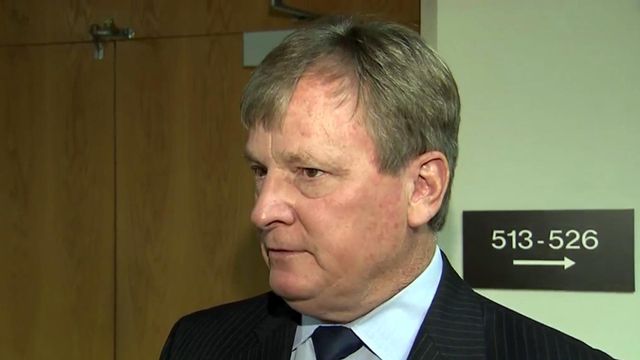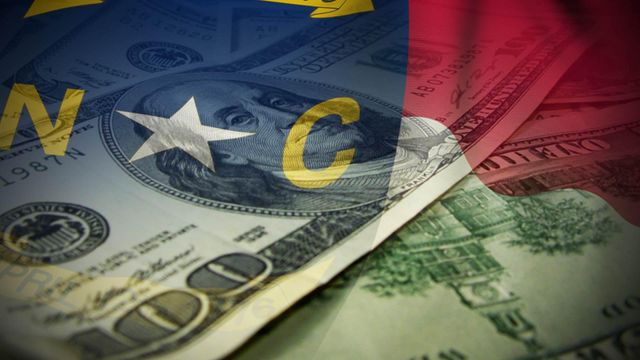'Gimmicks,' Cooper says as Republicans change tactics on budget
Big tax refund, mini-budgets for popular items headed the governor's way.
Posted — UpdatedOther Democrats were more predictive. Sen. Floyd McKissick, D-Durham, said he expects a Cooper veto, and the refund legislation in particular "seems more for political messaging."
"My best guess, they’ll keep doing it incrementally to try to go as far as they can to force Gov. Cooper to veto significant provisions he would otherwise agree with because they like to use it for political capital. That’s all it’s about," McKissick said.
The governor said he'd rather see the state budget surplus spent on education. Spending on items like textbooks and classroom supplies are still well below where they were before the recession in 2008, he said, and teacher pay still isn't keeping up with surrounding states.
The piecemeal budget bills that Republicans are preparing are just another way to avoid negotiations on the $24 billion state budget and a Medicaid expansion that would give hundreds of thousands of North Carolinians federally funded health insurance, Cooper said.
The coming raft of bills opens a new chapter in a fight with no discernable end. One veteran lobbyist said Thursday this feels like "the end of the beginning."
Cooper said that, perhaps, Republican leaders have accepted that they won't be able to get enough Democrats to side with them to override his budget veto.
"Breaking the budget up into pieces is yet just another way to try to get the budget 100 percent their way, and it’s frustrating not to be able to sit down and start talking about this," he said.
These bills will be politically difficult for the governor to veto – and for Democratic lawmakers to hold together on an override vote. On Thursday, the state Senate moved the refund bill – up to $125 for every taxpayer in North Carolina – and raises for state correctional officers through committees.
The state's prisons are plagued with staffing issues that have been blamed, in part, for inmate violence and officer deaths. The vacancy rate hovers around 20 percent and is worse in some areas.
Sen. Chuck Edwards, R-Henderson, said in committee Thursday that the warden at Craggy Correctional Center in Asheville told him four officers left shortly after Cooper vetoed the full budget and the salary boosts it contained.
The warden, Edwards said, had been telling them to hold on, that raises were coming. When they didn't come through, all four left for jobs at the the Buncombe County jail.
A state Department of Public Safety spokesman confirmed the basics of the story and said the Buncombe County jail pays about $6,000 more a year than the state prison.
School starting without raises
In addition to raises for correctional officers, legislative leaders have said they'll start moving pay increase bills next week for state employees and teachers.
They've not said how much those raises will be. Cooper's original budget had higher teacher raises, while the legislative budget did bigger raises for state employees. But Republicans are hoping the governor gets much of the blame from teachers as school begins.
Not only will teachers not see the percentage raises they would have gotten with a final budget, they won't get their annual $1,000 step increases until the impasse is solved.
House Speaker Tim Moore noted that in a news release Thursday, accusing the governor of holding up "higher pay for thousands of North Carolina families, their communities and their school systems" over Medicaid expansion.
Cooper has consistently pushed back against that stance, saying Medicaid expansion or something like it has to be on the table in a budget discussion but is not an ultimatum.
Senate President Pro Tem Phil Berger said in a letter to the governor this week that Cooper told him he wouldn't sign a budget unless he also gets expansion, but the governor said Thursday that's not true.
"I have said clearly that I don't know what the end result will be," he said. "Make an offer to me. ... It may be something that (Berger) doesn't believe is Medicaid expansion that gets more health insurance to people."
"He may hear one thing, and I may say another," Cooper said. "So, I think what we're getting into now is semantics."
Moore, R-Cleveland, was in Robeson County Thursday, talking up the Republican budget in a part of the state known for swingy political districts. He planned to visit the University of North Carolina at Pembroke, where his office noted a $91 million health science center is on hold without the budget. Also in the budget: $25.7 million for capital projects in Robeson County schools and $6.5 million for Robeson Community College, his office said in a release.
It's Republicans, Cooper said, who've blocked negotiations by refusing to respond to a budget counteroffer the administration sent them more than 40 days ago.
"Tell me where they have moved one inch," the governor said, speaking to reporters after a meeting with EMS officials to talk up Medicaid expansion.
Refund processing: $5.56 million
The state budget ran an $897 million surplus the last fiscal year, and Republican lawmakers want to refund more than $663 million of that back to taxpayers.
Instead of waiting for tax season, they hope to have the Department of Revenue cut a checks for about 5.1 million taxpayers, with most of them mailed out by Dec. 15. People would get $125 apiece – $250 for a couple that filed jointly – or the total amount of state income tax they paid this year, whichever is less.
That means DOR would send out approximately 3.8 million checks, with each mailing costing the state about $1.02, according to a fiscal analysis attached to House Bill 74, which lays out the plan's details. The state would expect something like 1 percent of the checks to be returned to sender, triggering another round of mailings. The state also expects to send 1.3 million taxpayers a 1099-G form so they could report the refund to the federal government for tax purposes.
Those would cost 43 cents a mailing.
The DOR also figured that the large number of checks would require it to outsource some of the printing, costing about $1 million. Finally, a public relations campaign to help people understand the refund is budgeted at $100,000, the fiscal note states.
That is, of course, all assumes the measure gets past the governor.
"I'll look at whatever they send to us, but this sounds more like a gimmick to me," Cooper said. "It's going to cost millions of dollars to even do this. So let's use that money to invest in teacher pay and education."
Altogether, the refund would cost $5.56 million. The bill has another $12.5 million in it for routine upgrades at the DOR, spending down about $681 million of the nearly $900 million surplus.
Legislative leaders said earlier this week that they're still considering what to do with the rest of the money, but giving this big of a refund would require them to tinker with the budget they passed earlier this year, on hold because of Cooper's veto, because part of the surplus was already counted on in that budget plan.
Adding note from treasurer called smart politics
The rebate checks would be signed and sent out by state Revenue Secretary Ron Penny, a Cooper appointee, but the bill explicitly spells out that the mailing must include an "explanatory insert provided by the state treasurer," even though that agency is not involved in issuing the checks.
"I did not request this, talked to, corresponded with or meet with anyone on this subject," Folwell said in an email to WRAL News. "This issue and/or your questions have nothing to do with my decision to file for re-election. Any assertion to the contrary would be false."
"It's sort of like the photos of [Labor Commissioner] Cherie Berry on the elevator. It creates name recognition," McLennan said.
"That is a low-information kind of campaign," he said of the treasurer's race. "Not many people follow it, so if they want to protect one of their own on the Council of State, that’s a great strategy to employ."
Pat Ryan, a spokesman for Berger, R-Rockingham, said the letter is needed so people don't think the rebate check is a scam. The question of who should write it is a politically charged one, he said.
"It seems to us that the most logical answer is that, since the money comes from the state treasury, the state treasurer should be the one who explains it," Ryan said in an email to WRAL News. "If others have a better idea, then we’re happy to listen."
Sen. Mike Woodard, D-Durham, called the letter from Folwell "nothing more than a re-election ad" and said the North Carolina Republican Party or Folwell's campaign should pick up the cost of mailing the refunds.
"We should have a thorough discussion about the fiscal responsibility of pulling $680 million out of the state’s hard-pressed budget," Woodard added in an email to WRAL News.
McLennan said Democrats are going to have to work to counter the maneuver or frame it differently.
"The question is, what can they do to counter the narrative that Folwell is, in fact, giving you money? And that’s going to be a challenge for the Democrats," he said. "So many things will have happened between now and November 2020, I’d be interested to know how many people recall that they actually even got a check from the state of North Carolina."
Surpluses common in other states
A strong national economy and changes in federal tax law that boosted state corporate tax collections last year mean a lot of states have budget surpluses this summer.
Virginia is doing a refund, though, and couples filing jointly will get about $220 there.
Connecticut is putting more than $541 million into its Teachers' Retirement System and into a legal settlement with the state's hospitals, the association of budget officers reported. Florida is doing refunds to corporate taxpayers, Indiana's governor hopes to spend $300 million on capital projects and Massachusets has a law that requires it to invest more than $1 billion in its "rainy day" reserve fund.
North Carolina's rainy day fund has about $1.3 billion in it now. The budget that's on hold would have put another $700 million to it.
Related Topics
• Credits
Copyright 2024 by Capitol Broadcasting Company. All rights reserved. This material may not be published, broadcast, rewritten or redistributed.






